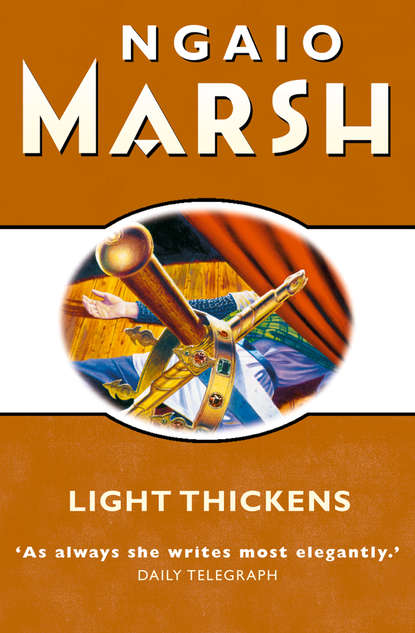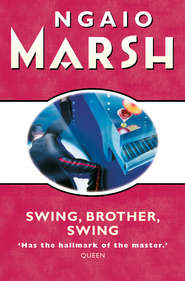По всем вопросам обращайтесь на: info@litportal.ru
(©) 2003-2024.
✖
Light Thickens
Автор
Год написания книги
2019
Настройки чтения
Размер шрифта
Высота строк
Поля
‘It’s his biggest role so far, isn’t it?’ Emily asked.
‘Yes. He was a good Benedict, but that’s the only other Shakespeare part he’s played. Out of Scotland. He had a bash at Othello in his repertory days. He was a fantastic Anatomist in Bridie’s play when they engaged him for the revival at the Haymarket. That started him off in the West End. Now, of course, he’s way up there and one of our theatrical knights.’
‘How’s his love life going?’
‘I don’t really know. He’s making a great play with Lady Macbeth at the moment but Maggie Mannering takes it with a tidy load of salt, don’t worry.’
‘Dear Maggie!’
‘And dear you!’ he said. ‘You’ve lightened the load no end. Shall I tackle Nina and tell her not to? Or go on pretending I haven’t noticed?’
‘What would you say? “Oh, by the way, Nina darling, could you leave off the bad luck business, scaring the pants off the cast. Just a thought!”’
Peregrine burst out laughing and gave her a slap. ‘I tell you what,’ he said, ‘you’re so bloody sharp you can have a go yourself. I’ll ask her for a drink here, and you can choose your moment and then lay into her.’
‘Are you serious?’
‘No. Yes, I believe I am. It might work.’
‘I don’t think it would. She’s never been here before. She’d rumble.’
‘Would that matter? Oh, I don’t know. Shall we leave it a bit longer? I think so.’
‘And so do I,’ said Emily. ‘With any luck they’ll get sick of it and it’ll die a natural death.’
‘So it may,’ he agreed, and hoped he sounded convincing. ‘That’s a comforting thought. I must return to the blasted heath.’
III
He wouldn’t have taken much comfort from the lady in question if he could have seen her at that moment. Nina Gaythorne came into her minute flat in Westminster and began a sort of de-lousing ritual. Without even waiting to take off her gloves she scuffled in her hand—bag, produced a crucifix which she kissed, and laid on the table a clove of garlic and her prayer book. She opened the latter, put on her spectacles, crossed herself and read aloud the 91st Psalm.
‘Whoso dwelleth under the defence of the Most High,’ read Nina in the well-trained, beautifully modulated tones of a professional actress. When she reached the end she kissed her prayer book, crossed herself again, laid her cyclostyled part on the table, the prayer book on top of it, the crucifix on the prayer book, and, after a slight hesitation, the clove of garlic at the foot of the crucifix.
‘That ought to settle their hash,’ she said, and took off her gloves.
Her belief in curses and things being lucky or unlucky was not based on any serious study but merely on the odds and ends of gossip and behaviour accumulated by four generations of theatre people. In that most hazardous profession where so many mischances can occur, when so much hangs in the precarious balance on opening night, when five weeks’ preparation may turn to ashes or blaze for years, there is a fertile soil indeed for superstition to take root and flourish.
Nina was forty years old, a good dependable actress, happy to strike a long run and play the same part for months on end, being very careful not to let it become an entirely mechanical exercise. The last part of this kind had come to an end six months ago and nothing followed it, so that this little plum, Lady Macduff, uncut for once, had been a relief. And the child might be a nice boy. Not the precocious little horror that could emerge from an indifferent school. And the house! The Dolphin! The enormous prestige attached to an engagement there. Its phenomenal run of good luck and, above all, its practice of using the same people, once they had gained an entry, whenever a suitable role occurred: a happy engagement. Touch wood!
So, really, she must not, really not, talk about ‘the Scots play’ to other people in the cast. It just kept slipping out. Peregrine Jay had noticed and didn’t like it. I’ll make a resolution, Nina thought. She shut her large faded eyes tight and said aloud:
‘I promise on my word of honour and upon this prayer book not to talk about you-know-what. Amen.’
IV
‘Maggie,’ shouted Simon Morten. ‘Hold on. Wait a moment.’
Margaret Mannering stopped at the top of Wharfingers Lane where it joined the main highway. A procession of four enormous lorries thundered past. Morten hurried up the last steep bit. ‘I got trapped by Gaston Sears,’ he panted. ‘Couldn’t get rid of him. How about coming out for a meal? It won’t take long in a taxi.’
‘Simon! My dear, I’m sorry. I’ve said I’ll dine with Dougal.’
‘But – where is Dougal?’
‘Fetching his car. I said I’d come up to the corner and wait for him. It’s a chance to talk about our first encounter. In the play, I mean.’
‘Oh. I see. All right, then.’
‘Sorry, darling.’
‘Not a bit. I quite understand.’
‘Well,’ she said, ‘I hope you do.’
‘I’ve said I do, haven’t I? Here comes your Thane in his scarlet chariot.’
He made as if to go and then stopped. Dougal Macdougal – it was his own given name – pulled in to the kerb. ‘Here I am, sweetie,’ he declared. ‘Hullo, Simon. Just the man to open the door for the lovely lady and save me a bash on the bottom from oncoming traffic.’
Morten removed his beret, pulled on his forelock and opened the door with exaggerated humility. Margaret got into the car without looking at him and said, ‘Thank you, darling.’
He banged the door.
‘Can we drop you somewhere?’ Dougal asked, as an afterthought.
‘No, thank you. I don’t know where you’re going but it’s not in my direction.’ Dougal pulled a long face, nodded and moved out into the traffic. Simon Morten stood looking after them, six foot two of handsome disgruntlement, his black curls still uncovered. He said: ‘Well, shit off and be damned to you,’ crammed on his beret, turned into the lane and entered the little restaurant known as the Junior Dolphin.
‘What’s upset the Thane of Fife?’ asked Dougal casually.
‘Nothing. He’s being silly.’
‘Not by any chance a teeny-weeny bit jealous?’
‘Maybe. He’ll recover.’
‘Hope so. Before we get round to bashing away at each other with Gaston’s claymores.’
‘Indeed, yes. Gaston really is more than a bit dotty, don’t you think? All that talk about armoury. And he wouldn’t stop.’
‘I’m told he did spend a short holiday in a sort of halfway house. A long time ago, though, and he was quite harmless. Just wore a sword and spoke Middle English. He’s a sweet man, really. He’s been asked by Perry to teach us the fight. He wants us to practise duels in slow motion every day for five weeks, building up muscle and getting a bit faster very slowly. To the Anvil Chorus from Trovatore.’
‘Not really?’
‘Of course not, when it comes to performance. Just as rehearsals to get the rhythm. They are frightfully heavy, claymores are.’
‘Rather you than me,’ said Maggie, and burst out laughing.
Dougal began to sing very slowly. ‘Bang. Wait for it. Bang. Wait again. And Bangle-bangle-bang. Wait. Bang.’
‘With two hands, of course.’











